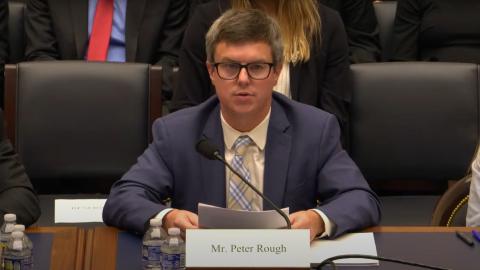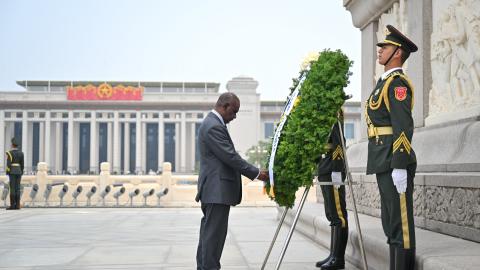A race is currently underway in Tokyo to determine the next president of Japan’s largest political party, the Liberal Democratic Party (LDP). The winner is likely to become Japan’s next and 101st prime minister this October.
Hudson Institute is committed to strengthening the United States–Japan relationship and fostering a free and Open Indo-Pacific. The next prime minister of Japan will be an important figure in the future of the US-Japan alliance.
Therefore, Hudson Institute’s Japan Chair has reached out to each of the LDP presidential candidates asking if they would be willing to share their views on the future of Japan’s foreign policy. The views below should not be associated with Hudson Institute or any of its affiliates.
Index
Click on the title to jump to this entry.
I. Japan’s Agenda for the New International Order | KONO Taro, Digital Minister of Japan
Japan’s Agenda for the New International Order
KONO Taro, Digital Minister and Former Foreign Minister and Defense Minister, Japan
The postwar liberal international order is under siege. States that do not share the universal values of freedom and democracy are attempting to change the status quo, and they are doing so by force. The global balance of power is shifting, quickly and dramatically. Russia has chosen the path of war to seek its national aims. Other powers are rising, such as China and the Global South. The United States, once the primary defender of the postwar order, can no longer do this alone, and Americans are reconsidering their role in the world.
Japan must step forward, with a renewed sense of purpose. As Japan stands at the crossroads of an increasingly complex and challenging global landscape, we must forge a path that safeguards our national interests and contributes to international peace and stability. My vision for Japan is clear: a nation that leads with courage, innovation, and unwavering commitment to our shared values of freedom, democracy, human rights, and the rule of law.
I. Strengthening our Strategic Partnerships
Relieving the Burden on the United States
Since the end of World War II, the United States has shouldered a significant burden to maintain a free and liberal international order. During this period, America’s allies, including Japan, have been able to keep their defense budgets low and invest in economic development. This international order, until now, has contributed to the economic prosperity of most countries, including the United States. But today many Americans question their role in the world, and some doubt the benefits that accrue from global leadership. Isolationism, once again, has emerged as the preferred option for some in the United States.
America’s allies need to show appreciation for America's past efforts while equally sharing the burden moving forward. Should the US commitment to maintaining peace and stability in regions such as Asia, Europe, and the Middle East waver, countries that share common values must prepare for a future where the United States may play a smaller role in assuring the security and prosperity of others. In Asia, regional security is shifting from a hub-and-spoke system centered around the United States to a regional system with mini laterals, such as the QUAD and the Japan-US-ROK trilateral, where the United States is the first among equals.
Ensuring Shared Values Become Shared Burdens
U.S. allies in Europe and in the Indo-Pacific must deepen their commitments to each other, and to a global order that respects human rights and the rule of law. Today, NATO allies are increasingly committing to help maintain peace and stability in Asia during a crisis, such as across the Taiwan Strait. Japan and other Asian partners must also be prepared to cooperate in upholding values like freedom, democracy and human rights outside our region. The Japanese people must actively support a global order organized around our shared values of freedom, democracy and human rights. This means accepting the political, economic, and security burdens with those nations that share our values.
National security, be it territorial, economic or cyber, can no longer be achieved by any one country alone. Nor can we depend solely on the United States to come to our rescue. Despite the deepening military cooperation between Japan and the United States in recent years, the debate within the U.S. over its global commitments suggests uncertainty over Washington’s longstanding security partnerships. Even the US commitment to NATO is sometimes questioned. Can we, in Asia, be sure of the American commitment under any circumstances? Strengthening security cooperation with the United States is vital but it is also essential for Japan to strengthen its security cooperation with countries that share our values.
Japan must declare its willingness to bear an appropriate share of the burden to protect global peace, stability, and democratic values. If we need allies to protect peace in Asia in the years ahead, then we should reciprocate the obligation. If necessary, we should consider amending the constitutional to allow us to build reciprocity in our future partnerships.
Enhancing Deterrence
If it becomes clear that the United States' external commitments are decreasing, concerns about the efficacy of its extended deterrence will inevitably arise. Should a future regime in Washington become isolationist and begin to question the value of alliances, will America defend its allies even with a significant cost to its people? In such a scenario, what should Japan do? We are surrounded by nuclear powers – China, Russia and North Korea.
Some might argue that Japan should pursue its own nuclear armament. But would Japan, however, having experienced the devastation of Hiroshima and Nagasaki, choose this path? If Japan were to arm itself with nuclear weapons, other countries, starting with South Korea, might follow suit, claiming deterrent needs for self-defense. As more countries start deploying nuclear weapons, the risk of nuclear war, triggered by computer errors, human mistakes, misunderstandings, miscalculations, or even terrorist acts, would certainly increase. So, Japan should not choose this path of nuclear proliferation.
Beyond our nation’s tragic experience as the only people who have suffered from the use of nuclear weapons on our soil, initiating a nuclear weapons program would be impractical. It would halt the supply of nuclear fuel for power plants, leading to their shutdown. Additionally, where in Japan could nuclear tests be conducted? Japan should maintain its civilian nuclear technology through operating nuclear power plants, decommissioning the Fukushima plant, and developing small reactors for nuclear-powered, not nuclear-armed, submarines, while continuing to explore paths toward nuclear disarmament.
To deter against the use of nuclear weapons against us, Japan must build its own non-nuclear deterrence capability with long-range missiles and initiate a “our finger in the trigger” discussion in the Extended Deterrence Dialogue with the United States.
Yet there are many dimensions to deterrence. Japan should not aim to become a lion or tiger but rather an animal with long ears, sharp teeth, and claws. To have long ears, we need to work with the Five Eyes intelligence coalition and to eventually become the Sixth Eye. We already have close ties to the U.S., Canada, the UK, Australia and New Zealand. If Japan can join, not only will we benefit from access to intelligence, but it could also provide valuable perspective to the others.To achieve this, however, Japan must significantly upgrade its cybersecurity capability.
A new bill to establish an organization and capability for active cyber defense is currently being drafted. We also need to recruit and train human resources for the cyber domain.
The Japanese government should reorganize its intelligence community to consolidate capabilities that exist across the Cabinet Intelligence and Research Office, the International Intelligence Office of the Ministry of Foreign Affairs, the Defense Intelligence Headquarters of the Ministry of Defense, the Public Security Intelligence Agency, and the Police Public Security Department. To enhance our ability to accumulate, consolidate and analyze information, we must optimize the allocation of human and financial resources to establish an effective intelligence organization to match that of the Five Eyes nations.
II. Building a New, Inclusive International Order
In the face of rising authoritarianism, Japan will stand as a beacon of hope and leadership. We will push for reform of international institutions, ensuring that they reflect the realities of the 21st century and are equipped to address the challenges of our time. As we do so, Japan will take its rightful place as a leader in global governance, driving the creation of a new international order that is fair, just, and inclusive.
Expanding Relationships with the Global South
Japan needs to focus on building close relationships with the countries of the Global South.
When Putin unilaterally tried to change the status quo and invaded Ukraine, many countries of the Global South refused to join the sanctions against Russia. Many countries were voting against Russia at the United Nations, but fewer countries were willing to take meaningful action in response to Russian aggression. It is true that many of them depend on the food and energy supply from Russia, but a certain number of countries refused to support the sanctions imposed by the G-7. Some in the Global South have stated openly that the West, especially the United States, often applies a double standard and are unwilling to go along unconditionally.
Considering the growing economic power of the Global South and the development of their industries, Japan should shift from government sponsored, ODA-centric economic approach to partnering with these countries, and instead encourage private sector Japanese investment and business expansion. Supporting the expansion of Japanese SMEs and startups into regions like the Middle East, Africa, and Latin America should be a policy priority. Expanding export and investment insurance to promote overseas investments is necessary. Japan needs to enhance foreign investments, promote exports of agricultural products, anime and manga, and infrastructure, and advance an economic security strategy.
I strongly believe that Japan should increase its engagement in the Middle East, where U.S. influence is waning. As Foreign Minister I did my best to promote Japan’s relations with the region. Even as we move away from fossil fuels over the long term, Japan's industry and economy remain reliant on oil and natural gas from the Middle East in the short term. Peace and stability in the Middle East are thus closely tied to the stable development of Japan's economy and society. Japan, historically having no negative legacy in the Middle East and being seen favorably by its people, should strengthen its political and security involvement in the region.
Japan can and should step up its efforts to maintain peace in the Middle East.
Navigating/Respecting Asia’s Relations with China
Managing relations with China, which could pose the greatest risk to Japan's future, is of utmost importance. Mutual understanding between the Japanese and Chinese people is crucial, and continuous and constructive engagement with China in various forms is necessary. Japan, at the same time, must persistently assert its stance on issues hindering bilateral relations, such as the actions of China's Coast Guard around the Senkaku Islands, the detention of Japanese citizens in China, and the frequent approaches of Chinese military aircraft into Japanese airspace. Japan must act to defend against Chinese military pressure when necessary.
Considering China's history of leveraging economic relations to impose political compromise, Japan needs to cautiously collaborate with the business community to avoid excessive supply chain dependence on China.
We are not in another Cold War. Countries in Asia do not want or need to choose sides. The Chinese economy is very extensive and intertwined with the global economy. China often provides more investment and economic assistance than the West, and does not talk about democracy or human rights. Many need Chinese investment in their economy and access to the Chinese market.
When I attended the ASEAN Defense Ministers’ Meeting in Bangkok in 2019, the Defense Ministers of the ASEAN member states kept telling me not to make them choose between the United States and China. But at the Gala Dinner in the evening, the Royal Thai Navy Band kept playing only American songs, from Louis Armstrong to Simon & Garfunkel. A tacit decision seemed to have been made. No country wants to be bullied or coerced, but leaders must feed their people.
Japan needs to understand the feelings of its neighbors and walk alongside these Asian countries, and, when it is possible, provide alternatives to China, be it market access, investment or technological cooperation.
Revising the United Nations Charter
The United Nations must be reformed to meet the needs of the 21st century. Its structure today still reflects the immediate post-World War II order, an order that no longer reflects the world we live in. Formerly defeated nations like Japan, Germany, and Italy have developed economically since the UN was formed. New economic powers like India, Brazil, China, South Korea, Saudi Arabia, Indonesia and many more are emerging. The Cold War, which limited the promise of the United Nations is also over. As expectations of the nations of the Global South for the United Nations grow, the current UN organization, especially the Security Council, fails to meet its potential.
The vetoes by the Security Council's permanent members have led to decision-making paralysis even in the face of blatant aggression or severe human rights abuses. The United Nations today has not only failed to prevent or halt aggression and conflicts but it has also failed to take necessary measures to restore order after conflicts end. It must be able to help protect people from suffering in the wake of war.
Since only the permanent members of the Security Council can exercise veto power, it is impossible to reform the existing United Nations Charter. We could learn from how the original states of the United States adopted its Constitution to nullify its original Articles of Confederation, which was, just like the UN Charter, almost impossible to amend. Instead of trying to make some amendments to the existing Charter and being blocked by the permanent members, Japan should call for adopting a new UN Charter to create a new international order that meets today’s needs.
An updated Charter must abolish the veto power that has made the UN dysfunctional, prevent unilateral changes to the status quo by force and grant the new United Nations the authority and capability to protect and assist refugees and displaced persons.
Beyond the UN, Japan’s diplomatic power can be enhanced by its leadership in many international organizations. Recently, countries are increasingly nominating former prime ministers or ministers instead of diplomats or bureaucrats as candidates. Japan needs to create career paths for its politicians and other qualified candidates, especially women, to become leaders in international organizations.
To be chosen for a senior position in international organizations, often a master's or doctorate degree is required, as well as the ability to speak multiple UN official languages. This differs from the traditional career paths of Japanese individuals. Japan should focus on sending individuals with diverse backgrounds and education to international organizations.
Bringing the United States In
Finally, Japan’s longstanding partnership with the United States also suggests another important role for us to play as a new international order is forged.
As the US is no longer the dominant power in the world, it must recognize, as one of the respected international players, the need to adhere to international rules. Whenever we criticize authoritarian regimes for not honoring the international rules, we are often asked questions like "What about the United States?" or "Why aren’t you criticizing Washington?" This is, unfortunately, a compelling narrative. As we promote the rule-based international order, the United States must participate in international agreements and treaties not yet acceded to, including the Comprehensive Test Ban Treaty, International Court of Justice, International Criminal Court, etc. Establishing an international order based on agreed-upon international rules requires Washington to act accordingly. Washington may argue that the US does adhere to international norms and rules, and, even if it is not a signatory, like the United Nations Convention of the Law of the Sea, the US would not act differently than it already does if it signed. If so, why would the United States not sign it? The White House should stop using the Senate as an excuse. The argument of not signing does not always mean that the country does not adhere to international rules gives a good excuse to authoritarian regimes for not signing. Japan, because we are a friend of the United States, must persistently persuade the White House and Capitol Hill on this matter.
The United States must also understand the importance of participating in the Trans-Pacific Partnership (TPP), which is, unlike the Indo-Pacific Economic Framework, not just a trade and economic agreement. TPP was meant to be a new rule making body among like-minded countries to promote common values in the Indo-Pacific region where China is increasingly exerting its power and trying to impose its rules. Japan must also persuade the United States to rejoin and participate actively in this initiative.
III. Modernizing Japan’s Defenses
While there is a national consensus to increase Japan's defense budget, the crucial issue is how to allocate that budget. We must improve the treatment of Self-Defense Forces personnel, review the size of the forces, and rebalance the composition of the ground, maritime, and air forces.
Ensuring the SDF’s Readiness
As Japan's population declines, it will be challenging to ensure a healthy SDF that is not too old and maintain a balance between officers and enlisted personnel. The SDF needs to secure new types of members to address rising threats in areas like cyber, space, and electromagnetic domains. Scholarship programs for officer candidates at universities should be established. Scholarships should also be provided for enlisted personnel to attend university after completing their military term, allowing them to return as officers after graduation. The Self Defense Forces must increase the number of female officers and soldiers and allow them to fulfill their full potential. Furthermore, efforts should be made to ensure enlisted personnel acquire qualifications and skills that are useful after retiring from the Self-Defense Forces.
The balance of ground, maritime, and air forces and the deployment of divisions must be boldly adjusted to shift from an era of preparing for Soviet tanks landing in Hokkaido to an era of preparing for threats from the air and sea to the southwest islands. We must rapidly enhance logistics, maritime transport capabilities, and handling capability of ports and airports in the Nansei islands.
We have learned much from the current war in Ukraine, and one of the most important lessons is the need for Japan to transition from heavy, large equipment to more mobile, technologically advanced weapon systems. The development of unmanned aerial vehicles and underwater drones, along with laser weapons, should be prioritized. Introducing unmanned combat aircraft will help prevent pilot fatigue as well as avoid their loss in battle.If our adversary is China, we should expect a high number of aerial and submarine encounters.
The SDF need to master new tactics, such as integrating unmanned assets with existing legacy systems and ensuring that all of these platforms are networked and communicate well.
Deploying a large number of underwater drones carrying torpedoes at the shallow exits of the East China Sea would deter the Chinese navy's entry into the Pacific. In conjunction, Japan should turn AUKUS into JAUKUS and consider the development and deployment of nuclear-powered submarines.
Japan's Defense Industry
Strengthening Japan's defense industry is also urgent. Most companies involved in Japan's defense industry are either very small, financially weak manufacturing businesses with little investment capacity, or divisions of large companies where defense-related sales and profits are a small portion of their overall business. Until now, the Japanese Self-Defense Forces have often been the sole customer for Japan's defense equipment, resulting in limited quantities and high unit costs. Orders for consumables and spare parts have been far from stable. Consequently, companies have been unable to set up production lines, resulting in high costs and lengthy delivery times.
Japan is surrounded by seas and thus is vulnerable to an interruption in supplies. Unlike Ukraine, which has allies on its land borders, Japan would be forced to rely on maritime transport should it require resupply in a conflict, and this could slow down the supply of weapons and ammunition from abroad.
Domestic weapons production is thus indispensable. Japan has historically been cautious about defense exports, but it must now expand its sales of defense equipment abroad to build its domestic production capacity.
While technologies originally developed for military purposes, such as GPS and the Internet, were then adapted for civilian use, recently civilian technologies have been increasingly used for military purposes. The line between military and civilian applications of technology is now blurred. Japan needs to better develop dual-use technologies, and more flexibly address its defense needs.
Historically, there have been anachronistic practices, such as the Japan Science Council's refusal to cooperate in defense-related research and development. These practices must be urgently revised, and research and development budgets should be increased under the Ministry of Defense. Necessary military research must be pursued, and collaborative research with other countries should be actively promoted.
Conclusion: A New Vision for Japan’s Future
In this pivotal moment in world affairs, Japan must step forward with a renewed sense of purpose. We must strengthen our alliances, not only with the United States but with all nations that share our vision for a free and open Indo-Pacific and an inclusive and just global order. We must build resilient economic partnerships, ensuring that Japan remains a cornerstone of stability and prosperity in Asia and beyond.
Our security depends on our ability to adapt to new threats, and I am committed to modernizing our defense forces, embracing cutting-edge technologies, and building a robust deterrence that will keep our nation safe. At the same time, we must champion global nuclear disarmament, upholding Japan’s legacy as the only nation to have experienced the horrors of nuclear war.
Our future depends on building strong partnerships. We must look to our ally, the United States, but also seek other partners who share our values, and we must encourage all to share the burdens inherent in this common goal of maintaining peace and prosperity. We should be ready to adapt - to be able to offer reciprocity to others as we build a new international order.
The time for bold leadership is now. Together, we can shape a future where Japan not only thrives but also leads the world in building a more peaceful and prosperous global community.













